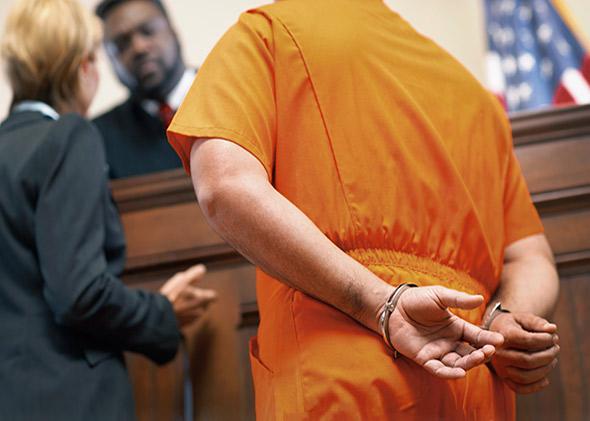Earlier this month, in an attempt to cut $2 million from its budget, North Carolina eliminated access to public counsel for thousands of poor criminal defendants each year. That’s not what the new law says: Tucked inside the state’s new budget, it reclassifies more than a dozen crimes into misdemeanors that cannot result in jail time. This is part of a pattern. Over the past two decades, swelling caseloads and fiscal belt-tightening have led several states, including Virginia and Minnesota, to create classes of crimes that can only be punished with a fine. In other states, the same thing happens case by case in the courtroom, where judges and prosecutors routinely declare they will not pursue jail time for minor infractions.
What’s not to like, if you’re caught with a small amount of drugs or driving without a license? The problem is that, left to fend for themselves in the courtroom, most defendants lack the basic legal skills to argue their innocence or reduce their punishment, and they’re often not told of the lifelong consequences that even minor convictions can carry. In an era when getting marked as criminal is often the severest punishment in itself, it makes increasingly little sense for only those facing incarceration to have a right to counsel.
The significance of petty convictions has changed a great deal since 1979, when the Supreme Court solidified this standard. Over the past three decades, the Internet has made criminal records available at a click, while public and private institutions have created myriad new restrictions on those with past convictions. More than ever, people with a record of misdemeanors, as well as felonies, are excluded from employment opportunities, student loans, food stamp eligibility, and professional licensing. A guilty plea to one of North Carolina’s new array of misdemeanors can enhance punishments for subsequent convictions. Also, an immigrant who racks up three or more misdemeanors can be deported. The same can happen with any one misdemeanor involving what the government deems “moral turpitude,” such as prostitution, selling drugs, or even writing a bad check.
Even before North Carolina’s new law took effect, judges commonly waived appointed counsel on small yet criminal marijuana charges, according to Matthew Suczynski, a criminal defense lawyer. “Most people being charged with marijuana possession are African-Americans, when they’re 17, 18 years old,” Suczynski told me. “Once they get convicted and have that mark against them, it’s nearly impossible to overcome. Those records are out there forever. It’s a system that just runs people over.”
More than 80 percent of defendants across the country are considered poor enough to be eligible for free defense counsel. At least 90 percent of all defendants will plead guilty to the charges they face. Research shows that defendants who don’t have lawyers are even more likely to simply enter a guilty plea, pay a fine, and be done with the process. That makes it cheaper for courts to run efficiently. The price, though, is often a clear understanding of the ramifications of pleading guilty.
In 2010 the Supreme Court recognized the importance of quality advice from attorneys in one especially fraught context. After pleading guilty in 2002 to a felony charge of transporting marijuana, Jose Padilla, a legal Honduran immigrant (not the Bush-era terrorism detainee), was threatened with deportation. Suing the state of Kentucky, Padilla said that his public defender had told him not to worry about this indirect effect of pleading guilty to the felony.
The court agreed, acknowledging that because new immigration laws had “dramatically raised the stakes” of conviction, publicly appointed attorneys must advise immigrant clients on potential immigration hazards of conviction. Justice Samuel Alito, writing in wary concurrence, predicted that, looking forward, the Padilla decision’s logic might be hard to contain to only cases involving deportation: “Criminal convictions can carry a wide variety of consequences other than conviction and sentencing, including civil commitment, civil forfeiture, the loss of the right to vote.”
While Padilla’s crime was a felony, the Supreme Court’s ruling applies also to misdemeanors, meaning that lawyers must advise their immigrant clients about the possibility that a guilty plea will lead them to be deported. The ruling, however, only applies to defendants who already have attorneys. Because immigration courts are not required to appoint public counsel, a growing number of immigrants go through both misdemeanor court and deportation proceedings without ever seeing a lawyer, notes Alice Clapman, a litigator at Planned Parenthood.
J.D. King, director of Washington and Lee’s Criminal Justice Clinic, argues that Padilla v. Kentucky cracks open the door to challenging the growing practice of refusing to give poor people lawyers for misdemeanor offenses they won’t go to jail for. But a universal right to counsel for all poor criminal defendants regardless of whether jail time is on the table is hard to imagine in the cash-strapped states that are cutting back on defense lawyers. A cheaper solution: move petty cases out of the criminal system altogether. California and New York recently decriminalized small marijuana charges. The states now issue civil citations that fine people without dragging them into the criminal system. Another possibility: a program Bob Boruchowitz, director of the Defender Initiative at Seattle University School of Law, helped Seattle and Spokane develop to divert cases away from the court system. Such programs allow prosecutors to drop charges if would-be defendants do things like take classes, pay fines, and perform community service.
These efforts ease the caseloads of overburdened public defenders, allowing them to devote more time to the cases that do land in court. Last year the Brennan Center found that, on average, public defenders often spend a scanty total of six minutes with their clients at arraignment. By focusing on just one crime—driving with a suspended license—Boruchowitz says that Spokane’s diversion program reduced public defender caseloads by a third. That sounds a lot better than saddling poor defendants with consequences they’ve had no help thinking through.
